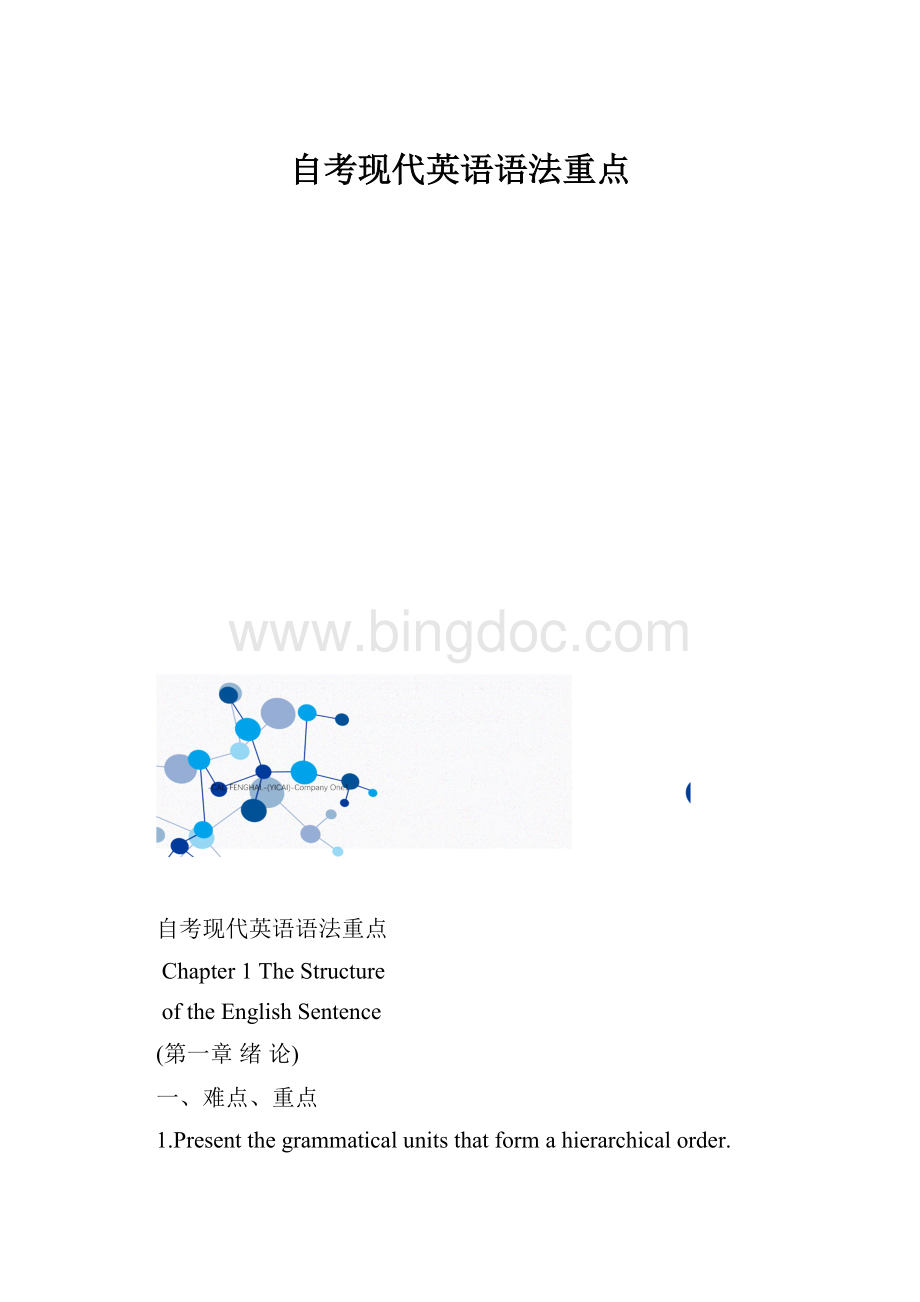自考现代英语语法重点.docx
《自考现代英语语法重点.docx》由会员分享,可在线阅读,更多相关《自考现代英语语法重点.docx(48页珍藏版)》请在冰点文库上搜索。

自考现代英语语法重点
自考现代英语语法重点
Chapter1TheStructure
oftheEnglishSentence
(第一章绪论)
一、难点、重点
1.Presentthegrammaticalunitsthatformahierarchicalorder.
(指出构成层次结构的语法单位.)
英语句子的结构层次是:
分句(clauses)、词组(phrases)、单词(words),图示如下:
高级层次句子(由一个或多个分句组成)
分句(由一个或多个词组组成)
词组(由一个或多个词组成)
低级层次词
如果从语义的角度来考虑,单词以下还可再分为词素(morphemes);句子以上还有更大的语言单位,即把句子按一定逻辑规则组织起来的语篇。
所以,从超语法的角度来看,语法层次结构可以如下图所示:
高级层次语篇(由广个或多个句子组成)
句子(由一个或多个分句组成)
分句(由一个或多个扣组组成)
词组(由一个或多个词组成)
词(由一个或多个词素组成)
低级层次词素
2.Morphemes词素(Terms:
morpheme,morph,allomorph,freemorphemeandboundmorpheme)
(注:
此部分内容的学习可以借鉴‘词汇学’的相关内容,然而必须注意两门课程描述的不同点。
)
什么是词素(morpheme)词素是语法的最小区别性单位,即最低一级的语法单位。
词素的语音或拼写法的体现叫形素(morph)。
词素是一种抽象形式的成分,在不同的环境中一个词素可以由若干个不同的形素体现,如英语中的复数词素可以表现为/s,z,iz/。
某一词素在不同的环境中可以用不同的变体或词素变体(allomorph)表示。
所谓词素变体是指词素的非区别性变体,几个不同的变体一起构成一个词素。
词素又分为自由词素和粘附词素。
自由词素(freemorpheme)是指本身具有完整意义,可以独立使用的词素。
它可以是简单的单词,如boy,girl,do,so等,也可以是派生词的词根,如im-polite,self-ish等。
自由词素具有较强的构词能力。
粘附词素(boundmorpheme)是指没有完整意义不能独立使用的词素。
粘附词素只表示一种附加意义或语法意义,这种词素不能单独存在和使用,只有粘附在其他词素(主要是自由词素)上才能表示出它的意义。
粘附词素的主要功能是在构词中充当词缀,如unfriendliness中的un-,-ly,-ness等。
3.Finiteclausesandinfiniteclauses(限定性分句与非限定性分句,定义参见下面的简答题部分)
注意这里分句的概念与传统语法的区别,特别是非限定性分句。
FiniteClauses
(1)名词性分句
Whathesaidwasincredible.
(2)关系分句
ThisisoneofthebestbooksI’veeverread.
(3)状语分句
IfIwereinyourshoes,Iwouldn’tquit.
Non-finiteclauses:
(1)非限定性名词性分句:
Shedidn’tknowwhattosay.
(2)非限定性关系分句:
Themanstandingbythewindowisherbrother.
(3)非限定性状语分句:
Publishedtenyearsago,thisisstillthebestdictionary.
二、重要概念
1.morpheme(参见第一部分测试题)
2.parsing:
Breakingasentenceintosmallercomponentsforanalysisandthengroupingthemintovariousclassesinasystematicway.
把一个句子中的各种词按语法范畴给出名称一如主语、宾语、动词、性、数、格等一叫做句子成分分析(parsing)。
3.Definethecomplexsentence
Thecomplexsentenceisasentencethatcontainsmorethanoneclause
thatarejoinedtogetherbysubordinatingonetoanother.[复杂句是用
从属连词(如if,when,though等)连接的一个以上分句的句子.]
三、典型考题
I.选择题
1.Thereare()morphemesin“gunfighter”.
A.twoB.three
C.fourD.one
2.In“Hedownedhisbeerandpunchedmeonthenose.”“downed”belongsto().(P13)
A.backformationB.clipping
C.conversionD.blending
3.Suffixesbasicallychange().
A.wordmeaningB.wordclass
C.nothingD.wordformation
4.Theprefix“uni-”means().
A.withoutB.self
C.falseD.one
Key:
1.B2.C3.B4.D
II.简答题
1.Intermsofwhichthreefactorsarewordsclassified?
Thethreefactorsare:
theenvironmentwherewordsoccur,theirinternalstructureandtheirmeaning.
2.Definethefiniteclausesandthenon-finiteclauses.
Thefiniteclausesaretheonesthathavesubjectsandfiniteverbsas
predicates.Thenon-finiteclausesaretheonesthatleavesubjects
unsaidandverbsinnon-finiteforms.(限定分句是主语加限定动词作谓语的
分句。
非限定分句是省略主语而动词以非限定形式出现(主语省略是因为其前面或
后面已有主语。
)
Chapter2
SentenceTypes
(第二章句子类型)
一、难点、重点
1.英语句子四大类型为陈述句,疑问句,祈使句和感叹句;这四种句型分别表示提供信息,寻求信息,要求动作进行和表达说话者的情感.
1.Explaintheconditionsinwhichweneedtousenon-assertivewordsinpositivestatementsandassertivewordsinquestions.(解释在肯定句中使用非肯定词和在疑问句中使用肯定句的情况。
)
Whenapositiveanswerisexpected,assertivewordscanbeusedin
questions,suchas:
WouldyoulikesomemorecoffeeIssomebodywaitingforme
Andinaffirmativesentencesinwhichtherearenegativeimport,if-clauses,
putativeshould-clauses,andcomparativeclauses,non-assertivewordscan
beused,suchas:
Heistooyoungtotakeanyjob.
Ifanyonecallsmeatthismoment,itmustbeXiaoZhang.
It’soddthattheheroshouldsayanythinglikethat.
He’sbetterthananyoneelseinthiscompany.
疑问句中如期望肯定回答,可用肯定词,在含有带否定含义的词,If-分句,should
推定分句,比较分句中也可用非肯定词.
3.Explainthedifferencebetweenatagquestionwithafinalrisingtone
andonewithafinalfallingtone.(解释附加疑问句结尾升调与降调的区别。
)
Witharisingtone,thequestionexpressesthespeaker’sneutral
expectationofthehearer’sresponseandinvitesthehearertoverifythe
truthofthepropositioninthestatement.Withafallingtone,the
speakerasksforthehearer’sconfirmationofthestatement.Itcanbe
regardedassimilartoanexclamation.(念升调,附加疑问句的说话者对对方
的回答不是很确定;念降调,说话者期望对方证实他的陈述,有点类似于感叹句。
)
Examples:
Lovelyweather,isn’tit?
(Seeingthestudent’sID)Youareastudent,aren’tyou?
以上两句,都应该念降调。
另外,在附加疑问句中,HAVE一词也是常考的重点:
Youhaveheardme,haven’tyou
(Auxiliary‘have’)
Maryhastoliveonherown,doesn’tshe?
Tomhascoffeewithmilk,doesn’the?
(Inthesenseof‘possess’,‘own’,etc.)Youhaveabighouse,don’t/haven’tyou?
4.Commands
1)Bepatient.(Command)
2)Youbepatient.(Emphaticeffect,ortolightacontrast)
3)Dobepatient.(Toreinforceacommand)
4)Bepatient,please!
(Tosmoothawayabruptness)
5)Youbepatient,please!
(Thissentenceisincorrect!
)
Sothefollowingsentencesarealsocommands:
1)Someonetakeouttherubbish.
2)Anybodyhelphim!
3)Everyonefreeze!
二、重要概念
1.Alternativequestions:
Thosequestionsthatsuggesttwo(ormore)alternativesandusuallyimplythatoneofthemcouldbetrue.
2.How-exclamations:
Exclamationsthatareledbytheadverb‘how’.Ithighlightstheadjective,adverb,orverbinexclamations.
三、典型考题
I.选择题
1.Youhavetowaitamoment,______
A.haven'tyouB.doyou
C.don'tyouD.shouldn'tyou
2."Marywasn'tinthereading-room,wasshe"
"_________."
A.Yes,shewasn'tB.No,shewas
C.Yes,shewasD.Shewasn't
Key:
1.c2.c
II.简答题
1.WhataretheverbswhichtransferrednegationoftenoccurswithWhatistheirsharedsemanticfeature(
2.转移否定经常与哪些动词同现它们有什么共同的语义特征)
Theverbswhichtransferrednegationoftenoccurswithare:
think,believe,suppose,imagineandexpect.Theyaretheverbsthatexpress“opinion”.(转移否定经常与think,believe,suppose,imagine和expect等动词连用。
这些动词都是表示“意见”的语义。
)
3.Whatarethetwomajortypesofexclamations(感叹句的两大类型是什么)
ThetwomajortypesofexclamationsareWHAT—exclamationsand
HOW-exclamations.Theformerisfollowedbyanounphrase;the
latterisfollowedbyanadjectiveoradverb.感叹句分为WHAT-
感叹句和HOW-感叹句。
前一种后接名词词组,后者接形容词或副词
III.完成下列句子
1.You’dratherwedidn’tgothere,_______
2.Idon’tthinkhewillcome,________
3.
4.Theymusthavelosttheirway,_____
5.Let’stalkaboutitlater,_____
6.
7.Everyoneishere,________
Key:
1.hadn’tyou2.willhe3.mustn’t/didn’tthey
4.shallwe5.isn’there/aren’tthey
Chapter3
NounandNounPhrase
(1):
NounandNumber
(第三章名词和名词词组
(1):
名词和名词的数)
一、难点、重点
1.Thefunctionsofnounphrases:
Infunction,anounphrasecanplaysuchgrammaticalrolesassubject,object,complement,modifierandevenadverbial.名词词组的功能,可以作主语、宾语、补语、修饰语(ateatable),有些的甚至可以作状语(yesterday,lastweek)。
2.Nounclasses
名词可以以多种方法分类,如具体名词(table,water)与抽象名词
(happiness,hatred),可数名词(table,girl)与不可数名词(water,
money),有生物名词(boy,monkey)与无生物名词(table,water)等.但名词
通常按以下方式分类:
名词-----|专有名词Propernouns
(nouns)|可数名词----------|普通名词(commonnouns)
(c.nouns)|物质名词(massnouns)
我们在可数名词和物质名词中还可以再划分具体名词和抽象名词:
名词--|专有名词
|普通名词--|可数名词--|具体名词(concretenouns)
(commonn.)||抽象名词(abstractnouns
|物质名词--|具体名词(concretenouns)
|抽象名词(abstractnouns)
3.缩略词:
加-’s,-s,双写或零形式复数,首字母缩略词,
加-‘s或-s:
MP(议员)MP’s/MPs
POW(战犯)POW’s/POWs
VIP(要人)VIP’s/VIPs
laserlasers
缩略词加-s,双写或用零形式复数:
缩略词加-s
Dr.(医生)Drs.
hr(小时)hrs.(或hr.)
yd.(码)yds.
Yr.(年)yrs.
双写:
ex.(例子)exx.
gal.(加仑)gall.
1.(行)ll.
p.(页)pp
或用零形式复数
ft.(英尺)ft
kg.(公斤)kg.
km.(公里)km
min.(分)min.
sec.(秒)Sec
4.熟记教材(P65)单位名称表
二、重要概念
1.Propernoun:
Propernounsarenounsreferringtospecificperson,placeorthing,suchasSmith,Mark(persons),WashingtonD.C.,London(places),NATO,UnitedNations(things)(专有名称是特指人,地方或事物的名词)
2.Massnoun:
Thosethatcannottakepluralaremassnouns,suchasbutter,cheese,homeworkmusic,etc.(没有复数形式的名词叫物质名词)
3.Unitnoun:
Itisalsocalled"partitive",isaveryspecialclassofwordsthatisusedtospecifythequantitiesmeasuresandshapesofthemodifiednounsuchas:
piece,batch,bunch,item,etc.(单位名词亦称“部分词”用于说明所修饰名词的量、大小和形状等)
4.Foreignplurals:
Theyarewordsborrowedfromsomeotherlanguageswhichstilltaketheiroriginalformsofplural,Mostoften,theyarefrom-Latin,French,Greek:
alumna--alumnae,index--indices,plateau--plateaux,analysis—analyses,etc.(外来词复数是指从外语中借来尚保持原来复数形式的复数名词,多是拉丁语、法语和希腊语等)
三、典型考题
I.选择题
II.1._________plasticsaremadeinthischemicalplant.
III.A.Manykindof
IV.B.Manykindsof
V.C.Manykinds
VI.D.Manykind
VII.
VIII.
IX.2."Jackhasjustmovedintoanewhouse."
X."Didhehavetobuy________forit"
XI.
XII.A.manynewfurniture
XIII.B.muchnewfurnitures
XIV.C.muchnewfurniture
XV.D.manynewfurnitures
XVI.
XVII.3.Michaeltook_______astowhatheshoulddo.
XVIII.A.hisfriend'sadvise
XIX.B.hisfriend'sadvises
XX.C.hisfriendadvice
XXI.D.hisfriend'sadvice
Key:
1.B2.C3.D
XXII.简答题
1.Collectivenoun:
Thesearegenerallycountablenouns,buteveninthesingulartheyrefertogroupsofpeople,animalsorthings,suchasfamily,class,team,government,committee,etc.(集体名词一般是可数名词,但就是单数,也指人,动物或事物的群体)
2.singularinvariables:
Theyarepropernounslikecountrynames,personalnamesandmassnounslikethosedenotingsciences,subjects,diseases,andgames.Forexample:
theUnitedStates,theUnitedNations,Black,Jones,classics,physics,bronchitis,bowls,et。
.(单数名词指的是某些国家名称,人名和表示学科、疾病和运动项目等形式上有以—s结尾的名词,一般用作单数)
3.pluralinvariables:
Theyare1)namesoftoolsandarticlesofdressconsistingoftwoequalparts:
binoculars,compasses,jeans,shorts,etc.2)somecollectivenouns:
cattle,people,police,etc.3)geographicalnamesofmountainranges,waterfalls,groupsofislands:
theRockies,theBalkans,NiagaraFalls,etc.4)othernounsendingin-s:
archiv